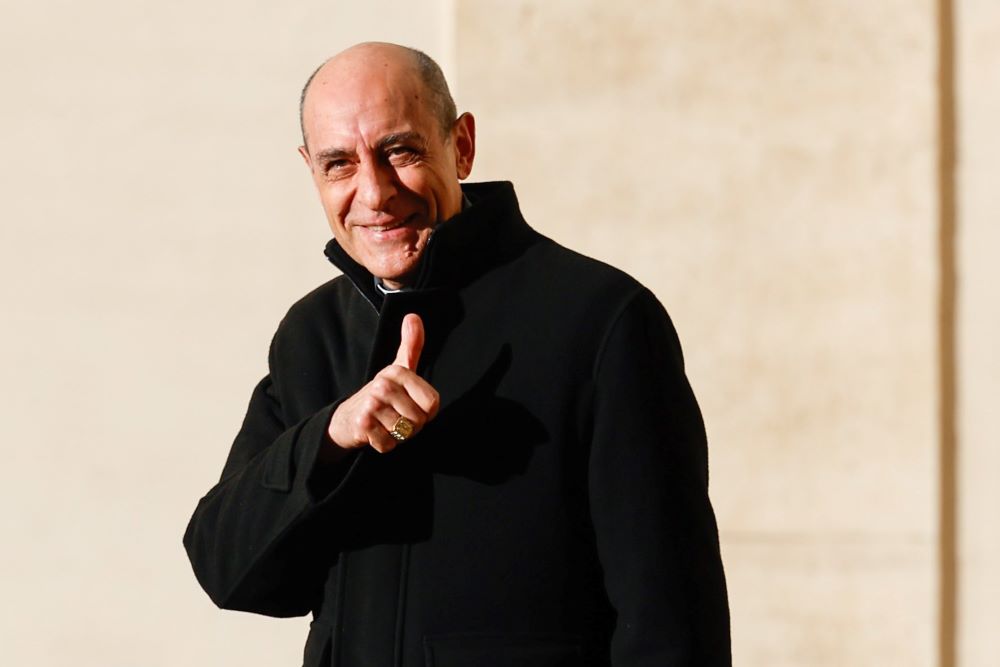
Cardinal Víctor Manuel Fernández, prefect of the Dicastery for the Doctrine of the Faith, gives a thumb up to journalists in the San Damaso Courtyard of the Apostolic Palace at the Vatican Feb. 12. (CNS/Lola Gomez)
When Pope Francis tapped Cardinal Víctor Manuel Fernández to head the Vatican's doctrinal office on July 1, 2023, he wasn't just naming his longtime Argentine theological adviser to one of the church's most powerful roles. He was also reenvisioning how that department would operate in the modern world and attempting to ensure that his reforms might outlast his own papacy.
Accompanying the announcement of Fernández's appointment in the Vatican's daily bulletin was a letter articulating that as prefect of the Dicastery for the Doctrine of the Faith, he should actively promote the work of theology and new ways of evangelization rather than replicating past "immoral methods" that sought to control or punish theologians.
"The text of the letter that the pope wrote to the new prefect is in some ways an epoch-making event," Italian theologian Andrea Grillo told the National Catholic Reporter. "It marked the official beginning of a new understanding of the function of the dicastery, moving away from the inquisitorial and censorious styles of the past."
"This certainly influenced the way the new prefect interpreted his role," added Grillo, who teaches at Rome's Pontifical Athenaeum of St. Anselm.
'He is like the canonist theologian who knows the smell of his sheep.'
—Jesuit Fr. James Keenan
At the time of the appointment, the now deceased American theologian Richard Gaillardetz declared it to be the "most consequential curial appointment of this 10-year-old pontificate."
One very busy year later, Fernández (or "Tucho," as he is called) has not just become Francis' closest curial collaborator, he also has emerged as a gatekeeper to the 87-year-old pope — and both men seem to be operating at a pace that indicates that they are well aware that time is not on their side.
Fiducia shockwaves and synodality
Even before Fernández officially assumed his role on Sept. 14, 2023, he gave a flurry of interviews where he signaled an openness to studying gay blessings and expressing his firm opposition to abortion. (The cardinal declined NCR's interview request for this article.)
With regular social media posts and a frank conversational style during Vatican press conferences, he immediately brought a new degree of accessibility and candor to an office long known for its secrecy and limited access.
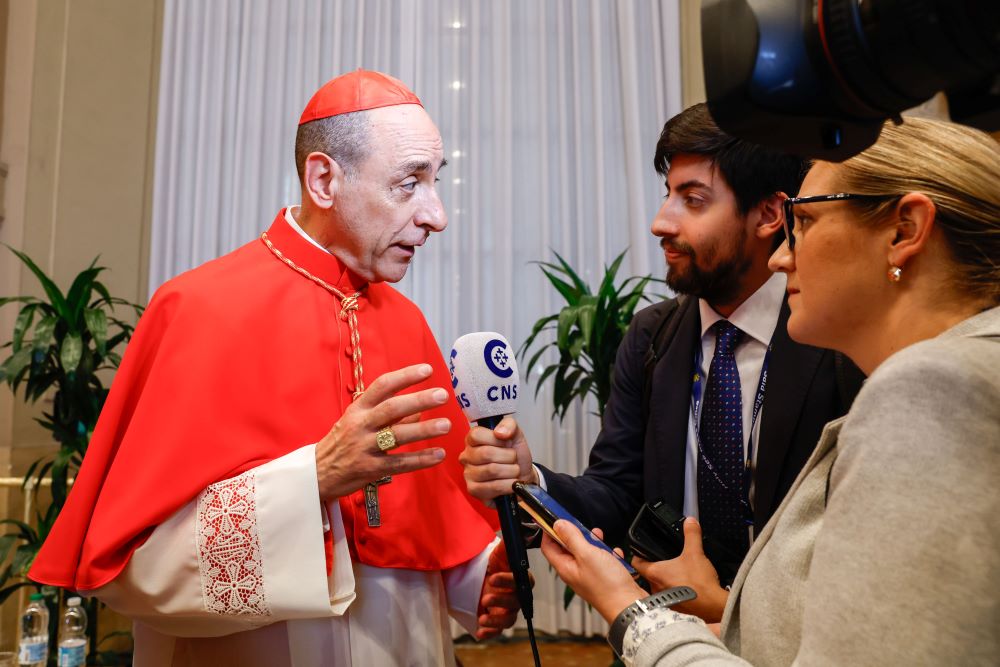
Cardinal Víctor Manuel Fernández comments on changes in the Dicastery for the Doctrine of the Faith, where he serves as prefect, as he meets a CNS reporter in the Apostolic Palace at the Vatican after Pope Francis made him a cardinal Sept. 30, 2023. (CNS/Lola Gomez)
Since arriving in Rome, he has operated at a feverish pace that has been met with equally fierce resistance. Past writings on sexuality and kissing have been called into question by his conservative detractors, and his mishandling of clergy abuse allegations during his time in Argentina have raised concerns about what this portends for the Vatican office responsible for investigating abuse complaints against minors.
None of this has slowed him down.
"It's been a very active and complicated first year for him," Villanova University theologian Massimo Faggioli told NCR. "And the reception has been mixed."
Under his watch, the Vatican's doctrinal office has released no fewer than a dozen public documents over the last year, compared to the publication of only a handful of documents in past calendar years.
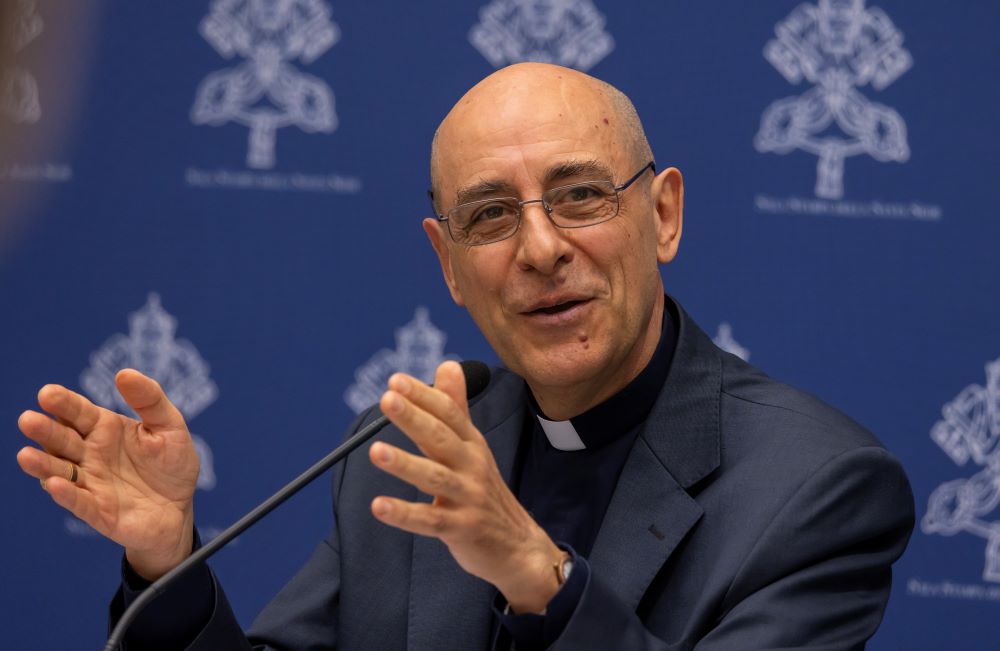
Cardinal Víctor Manuel Fernández, prefect of the Dicastery for the Doctrine of the Faith, speaks at a news conference to present the dicastery's declaration, "Dignitas Infinita" ("Infinite Dignity") on human dignity at the Vatican press office April 8. (CNS/Pablo Esparza)
The documents have included new rules on assessing alleged supernatural occurrences, a note clarifying that transgender individuals may serve as godparents and be baptized and a major new treatise on human dignity that condemned sex change operations, gender theory and surrogate motherhood.
But no document has caused more debate than when in December 2023, the doctrinal office released a new declaration, Fiducia Supplicans, allowing priests to bless individuals in same-sex relationships.
The decision sent shockwaves through parts of Eastern Europe and especially Africa, where the bishops issued a joint statement effectively rejecting the document. Later, the Coptic Orthodox Church cut off dialogue with Rome over the move, and in May, Fernández traveled to Cairo to meet with Pope Tawadros II in an effort to ease the tensions.
The release of Fiducia did not include a Vatican press conference to allow for further clarifications, which is standard practice for documents of such magnitude. Less than a month later, the cardinal issued a formal follow-up responding to the document's mixed reception. Adding to the confusion, the text caught most Vatican officials by surprise, including the pope's Council of Cardinal Advisers and members of the doctrinal office.
"If the document was not screened, it should not have been signed," said Grillo, who added that both in Fernández's documents and interviews the "relationship between [church] discipline and doctrine" has at times been vague.
Complicating things further is the fact that the release of Fiducia came in the midst of the pope's ongoing synod on synodality, where among the hot button issues that are still being discussed is the church's response to LGBTQ Catholics. One prominent cardinal charged that the timing of the document "discredited" the synod process itself.
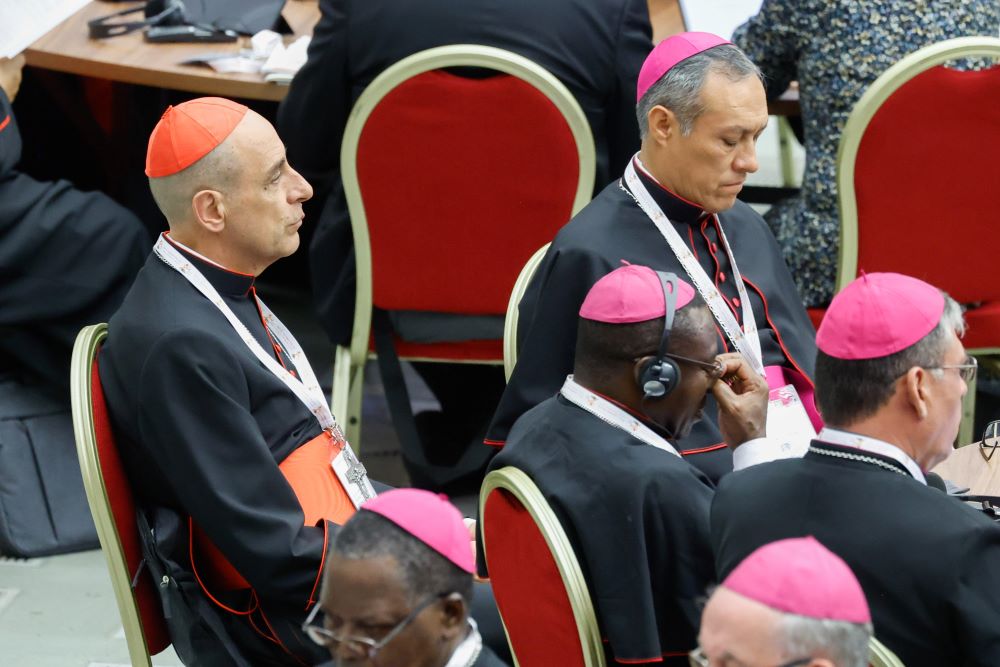
Cardinal Víctor Manuel Fernández, prefect of the Dicastery for the Doctrine of the Faith, participates in the first working session of the assembly of the Synod of Bishops in the Vatican's Paul VI Audience Hall Oct 4, 2023. (CNS/Lola Gomez)
In March, the Vatican announced that the pope had established 10 working groups to study some of the synod's most controversial topics that will work beyond the synod's conclusion this October. Two of the groups — one on "theological and canonical questions about specific ministerial forms" and the other on "theological criteria and synodal methodologies as a basis for shared discernment of controversial doctrinal, pastoral and ethical issues" — have been entrusted to Fernández's purview.
According to Faggioli, the study groups are the pope's efforts to encourage the work of collaboration and synodality, while at the same time his own authority.
"He is letting the commissions do their work, but he is also exercising his primacy in synodality," said Faggioli. "He is effectively saying, 'This is a synod, but I am the pope and the guy that I trust is Cardinal Fernández.' "
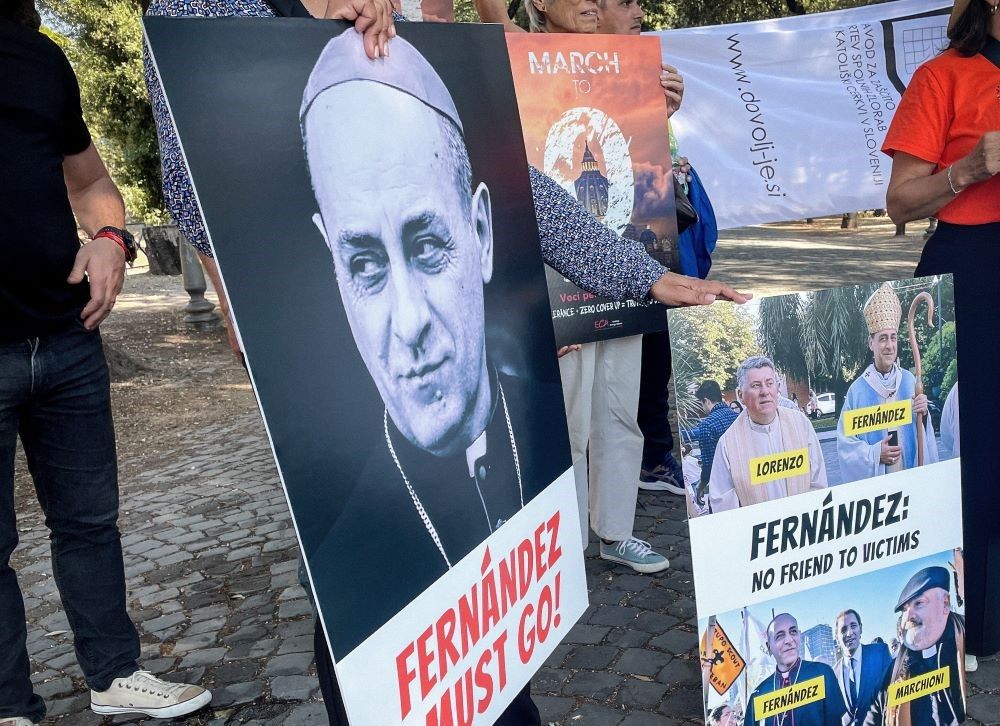
Representatives of international victims' initiatives demonstrate in Rome Sept. 28, 2023, holding protest posters, including one that reads, "Fernández must go!" and another that says, "Fernández: No friend to victims." Cardinal Víctor Manuel Fernández is prefect of the Vatican Dicastery for the Doctrine of the Faith. (OSV News/KNA/Anita Hirschbeck)
New policy and personnel
When Francis became pope in 2013, he inherited German Cardinal Gerhard Müller as head of the Vatican's doctrinal office. The conservative theologian who Pope Benedict XVI appointed in 2012 quickly proved to be a bad fit for the new pope's more pastoral style of governance.
At the conclusion of Müller's five-year term, Francis replaced him with Spanish Jesuit Cardinal Luis Ladaria, a low-profile individual who largely kept out of the public eye until his retirement last summer. The arrival of Fernández immediately signaled a new chapter for the office, both in terms of policy and personnel.
In Faggioli's estimation, it would have been near impossible for Francis to shake things up too dramatically until after the death of Benedict XVI. As Cardinal Joseph Ratzinger, he held the post for nearly a quarter century and earned a reputation as "God's Rottweiler" for his role as the enforcer of church law and the manner in which he sought to tamp down dissent among theologians.
Now, late into a very different papacy, Pope Francis' rottweiler has arrived on the scene with a very different mandate.
"Fernández is the first real successor to Joseph Ratzinger, and he's very different from him," Faggioli said of the Argentine cardinal's large public profile and the parallels between the trust Ratzinger and Pope John Paul II enjoyed and that bond between Francis and Fernández.
"He certainly has succeeded in becoming the cardinal to Pope Francis' right-hand," said Faggioli.
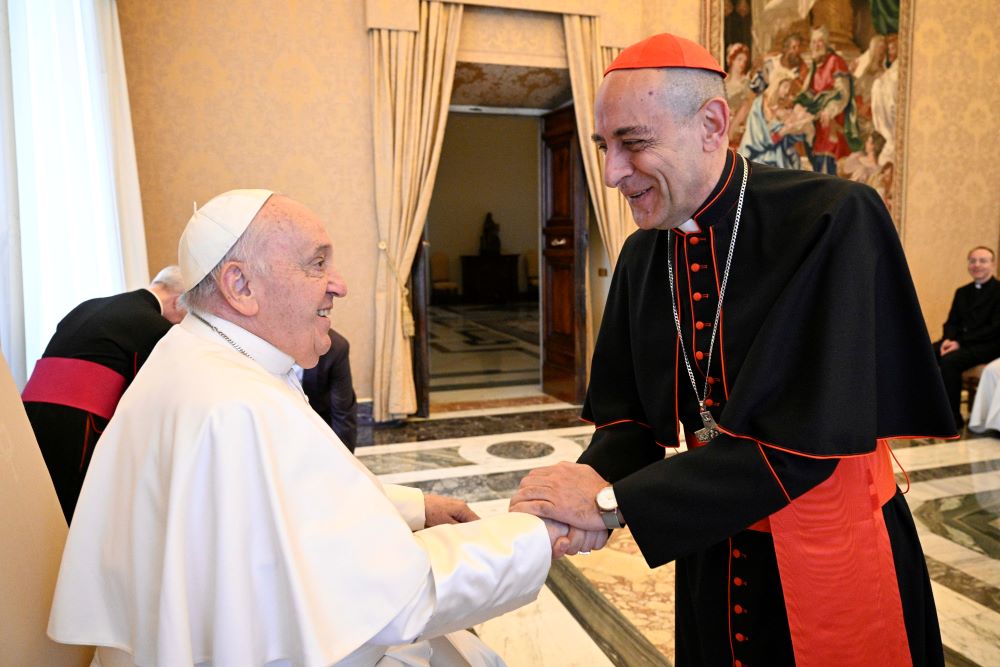
Pope Francis greets Cardinal Víctor Manuel Fernández, prefect of the Dicastery for the Doctrine of the Faith, during a meeting with members of the Pontifical Biblical Commission on April 11 at the Vatican. (CNS/Vatican Media)
Jesuit Fr. James Keenan, vice president of global engagement at Boston College, told NCR that Fernández has emerged as both "a public theologian and pastoral administrator."
Keenan recalled the publication of Francis' 2016 apostolic exhortation Amoris Laetitia, which among other things provided an opening to Communion for divorced and remarried couples. The document was, in part, ghostwritten by Fernández; later the pope would go on to promote the Argentine theologian's interpretation of the document as authoritative.
"It was clearly a way that the pope was showing us that the evident pastoral sensitivities of Fernández were constitutive of his theological leadership," said Keenan. "No longer could church teachings simply be reiterated, they needed to be applied credibly such that they conveyed an understanding of the struggles of the people of God."
"Fernández does this repeatedly," he added.
Advertisement
While the Vatican's doctrinal office — formerly known as "The Inquisition" — long held a reputation for enthusiastically suppressing heresies and restricting questionable theologians, Francis has used the Fernández appointment to chart a new direction for the church in the third millennium.
"I do not think that Fernández sacrifices or compromises the law of the church, but he's attentive to the hierarchy of truths and provides a pastoral hermeneutics through which he respects both the complexity of church teaching and the consciences of the faithful as they respond to the summons of Christ," said Keenan. "In this he is like the canonist theologian who knows the smell of his sheep."
Brazilian theologian Maria Clara Bingemer told NCR she believes this new direction will help "stimulate" theology so that it will be able to reflect on the theological revelations that "appear at the frontiers of life and thought."
"Theology supposes taking risks," she added, and "not being afraid of thinking."
And at 61, Fernández has shown he is energetic and willing to pioneer this new era at the Vatican in service of a reform-minded 87-year-old pope.
But, as Faggioli cautioned: "The pope's age makes his job riskier. It makes Fernández's survival after Francis a bit complicated."







